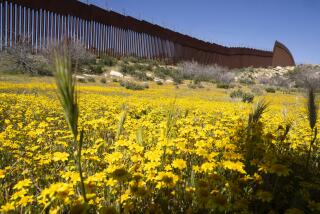Protecting Bolsa Chica Birds, Wetlands
- Share via
* The Amigos de Bolsa Chica wishes to express our deepest gratitude to the people at the Wetlands and Wildlife Care Center for their dedication in treating the birds of the Bolsa Chica that had come in contact with the oil spill of Dec. 13.
These volunteers ignored clocks, meals and personal comfort to see that every bird was cleaned, fed and healthy enough to be released back into the wild.
Thanks also to the California Department of Fish and Game, the U.S. Coast Guard and the many other agencies that moved into action as soon as the spill was discovered.
The impact of the spill would probably have been worse if they had not responded so quickly.
DAVID CARLBERG
President
Amigos de Bolsa Chica
Huntington Beach
* Thank you for your coverage of the Bolsa Chica oil spill and cleanup.
Prevention is our national priority, and cleanup is a much more expensive and less effective response. Even after cleanup, nature may take years to recover fully--if at all.
We are spending over $80 million to restore the Bolsa Chica wetland. This huge investment may pay off in the future with recreational quality of life, sustainable tourism, jobs, increased property values and biodiversity.
Payoff will occur only if there is increased concern and care on the part of cities, communities, neighborhoods and regulatory enforcement agencies for the ecosystem and its inhabitants.
What the wetlands ecosystem cannot survive is a permanent, perpetual and continuous pollution flow from the upland mesa greenbelt above the wetlands, where the wildlife flee in case of water-borne pollution.
Realistically, perhaps it is beyond our control to effectively prevent all future accidental or premeditated spills from the flood control channels.
What we can prevent is allowing over 1,200 expensive houses to be built on the mesa. What we can do is protect our $80-million investment by restoring the mesa habitat through a land swap so the developers can realize their profits by building somewhere that is already paved and polluted.
While we may be able to help nature recover from occasional pollution, it is inconceivable that we would guarantee more than occasional pollution by permitting the building of an unsustainable housing and business development 60 to 80 feet above an $80-million investment to restore a degraded wetland.
BRUCE MONROE
Chair, Restoration Panel
Southern California
Wetland Complex
More to Read
Sign up for Essential California
The most important California stories and recommendations in your inbox every morning.
You may occasionally receive promotional content from the Los Angeles Times.













